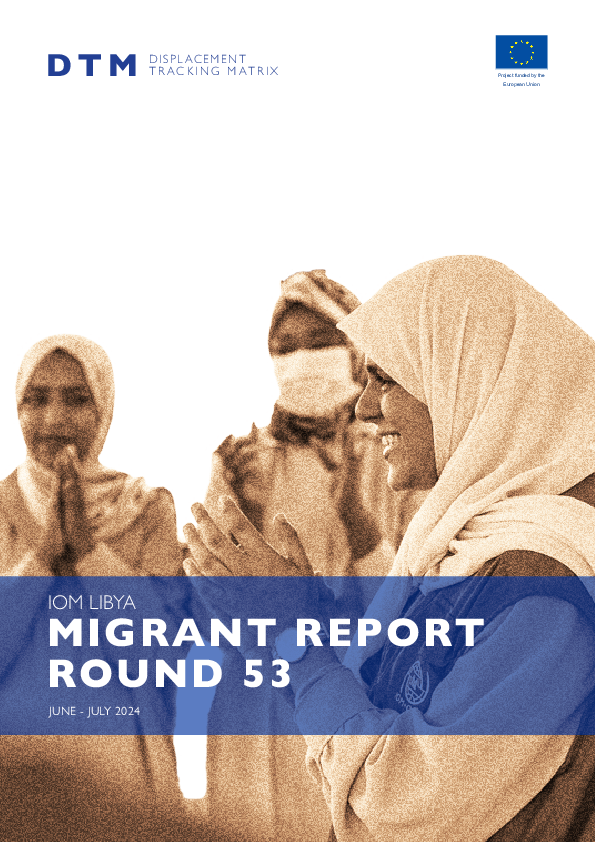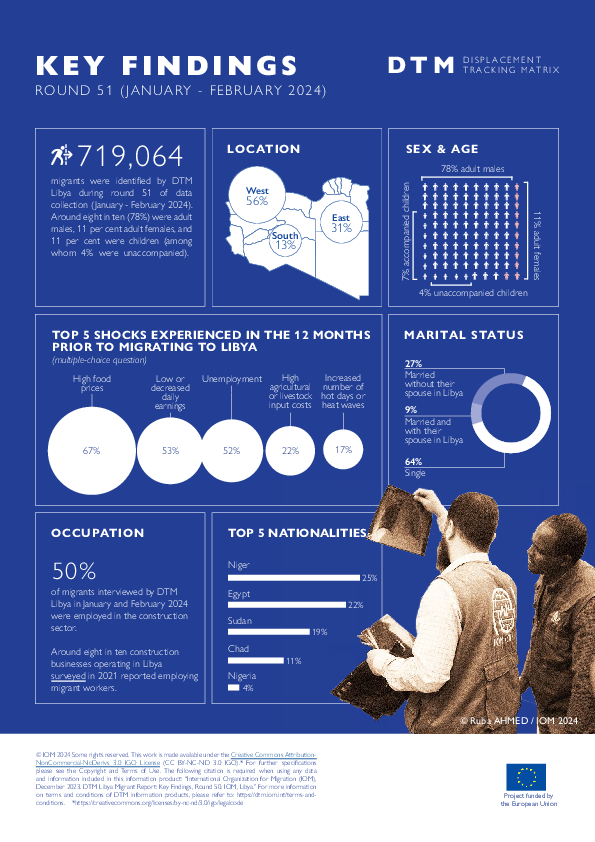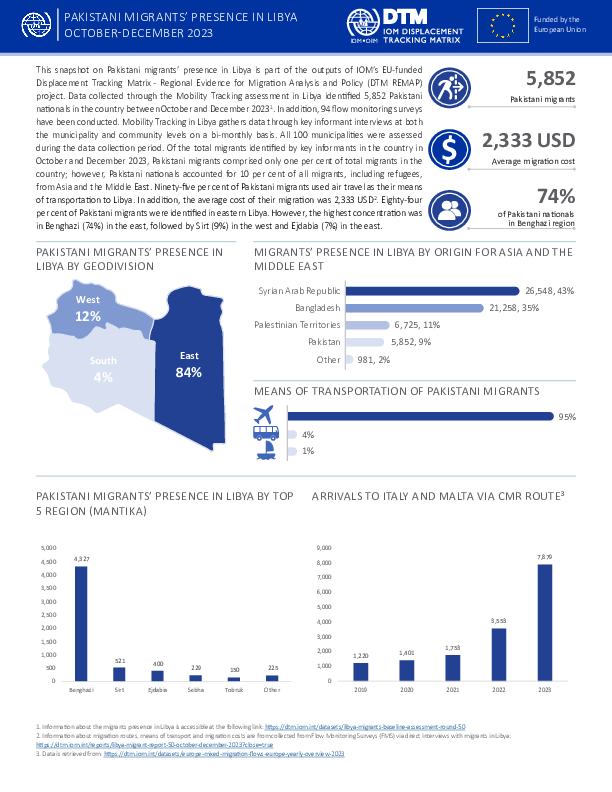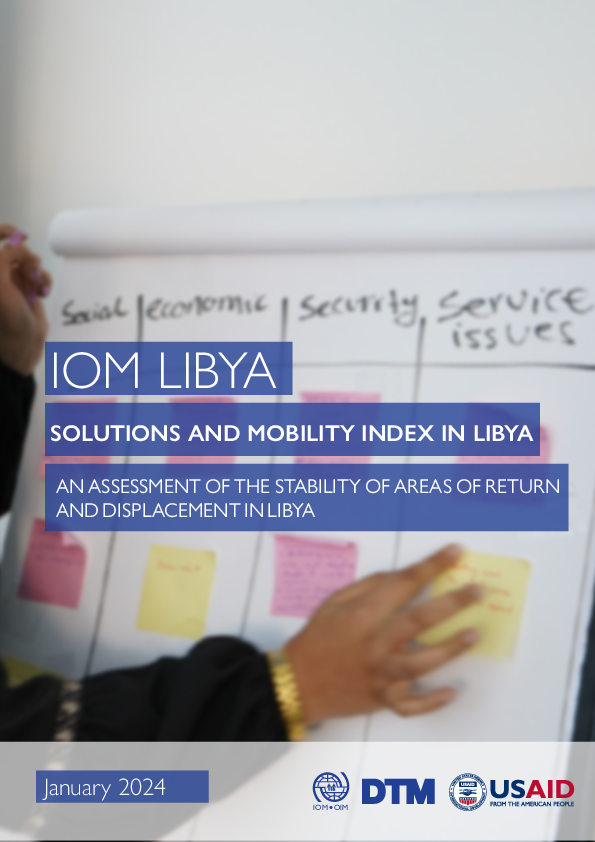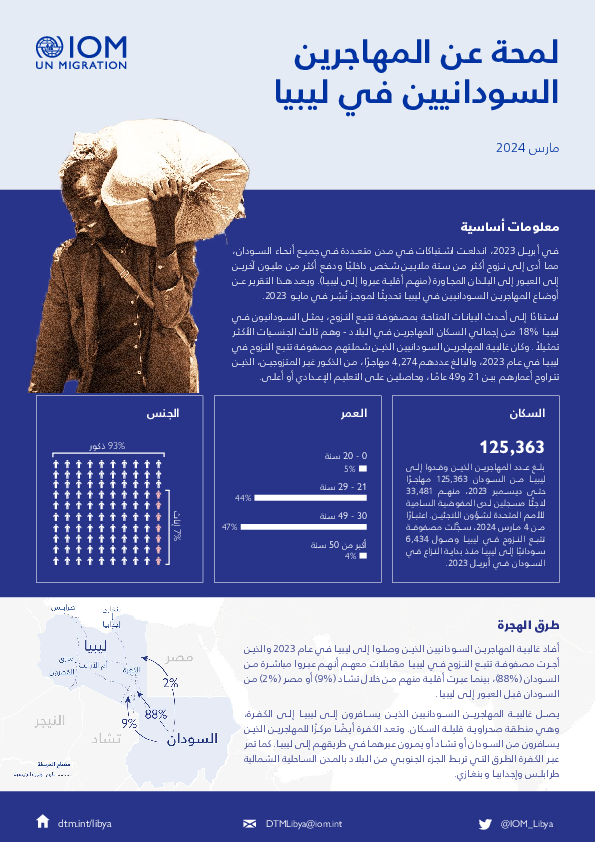-
Countries
-
Data and Analysis
-
Special Focus
-
Crisis Responses
Libya
À propos Libya
Libya is a geographically vast country with several regions that are difficult to access. In order to understand the full scope of humanitarian assistance that is needed throughout the country, IOM established the Displacement Tracking Matrix (DTM) programme in 2016 in order to provide a common operating picture concerning the movement of populations in Libya, allowing humanitarian actors to provide timely assistance to those in need. Following the escalation of conflict and insecurity in 2014, the security situation has remained volatile since with fluctuations in the intensity of localized clashes. Congruently, conflict has caused new displacements, often in areas ill-equipped to accommodate large population movements while also negatively impacting the large migrant population residing and transiting through Libya. More recently, the capital Tripoli was heavily affected by displacement waves in September 2018 and April 2019.
DTM’s mobility tracking and flow monitoring activities identified many migrants in-country to be in need of various forms of assistance. Libya’s geographic location, resources and work opportunities has made it both a country of destination and transit for migrants for many years. Despite the deterioration of the security situation since 2011 migrants continue coming to and transiting through Libya, the majority from Sub-Saharan and North African countries.
In this complex operating environment, DTM Libya has been providing a common operating picture concerning the movement of populations in Libya since 2016, allowing humanitarian actors to provide timely assistance to those in need. Through its mobility tracking, flow monitoring and needs assessment activities, DTM Libya has established itself as data hub for quantitative data on migratory flows to and within Libya, migrant presence in Libya disaggregated by nationality and area, as well as humanitarian needs of migrants, internally displaced population and returnees. All activities are implemented through periodical bi-monthly data collection cycles, allowing trend analysis over time to provide evidence-base for both policy-level discussions and to guide humanitarian action.
In order to facilitate humanitarian interventions, DTM works closely with IOM’s other programmes through referring identified populations in need of assistance at flow monitoring points to IOM’s Direct Assistance, Health, Voluntary Humanitarian Return (VHR), Protection and Migrant Rapid Response Mechanism (MRRM) programmes. Furthermore, DTM Libya supports other humanitarian partners through providing emergency tracking updates in case of sudden population movements as well as facilitating humanitarian assessments for the Rapid Response Mechanism (RRM) jointly implemented by IOM, UNICEF, WFP and UNFPA.
For more information on IOM's activities in Libya, please visit the IOM Libya country office website.
Contacter
DTM Libya
DTMLibya@iom.int
Bailleurs de fonds
- EUTF
Libya — Storm Daniel Displacement Update (September 2024)
This report highlights the situation of internally displaced persons affected by Storm Daniel in northeastern Libya as of September 2024.The report highlights that the number of displaced persons has decreased to 32,102, with 93% of those displaced now on pathways toward durable solutions.
Libya — Migrant Report 53 (June - July 2024)
IOM Libya’s Displacement Tracking Matrix (DTM) programme identified a total of 761,322 migrants from 44 nationalities in the 100 Libyan municipalities during round 53 of data collection (June - July 2024).
Sep 04 2024
Libya — Migrant Report 53 (June - July 2024)
Migrant Report Key Findings 53 (June - July 2024)
This infographic presents the key findings of Round 53 of the mobility tracking and flow monitoring components of the Displacement Tracking Matrix (DTM) programme in Libya.
Libya — Floods in Ghat • Flash Update 2 (23 August 2024)
Over 7,000 individuals have been displaced in the region of Ghat (southwestern Libya) after heavy rains caused flooding in the towns of Ghat and Tahala on 16 August 2024.
Libya — Floods in Ghat • Flash Update (18 August 2024)
Over 5,800 individuals have been displaced in the region of Ghat (southwestern Libya) after heavy rains caused flooding in the towns of Ghat and Tahala. The majority of displaced individuals are being hosted by family members while others are sheltered in camps and schools.&nb
Libya — Floods in Southeastern Libya • Flash Update (13 August 2024)
Nearly 3,000 individuals have been displaced in Alkufra and Rabiana (southeastern Libya) after heavy rains caused flooding and a power outage on 11 August 2024.
Profile of Migrants from Pakistan in Libya (July 2024)
This profile provides information on the most recent migration dynamics between Pakistan and Libya as well as the sociodemographic characteristics of Pakistani migrants and information on the routes they travelled to reach Libya.
Profile of Migrants from Bangladesh in Libya (July 2024)
This profile provides information on the most recent migration dynamics between Bangladesh and Libya as well as the sociodemographic characteristics of Bangladeshi migrants and information on the routes they travelled to reach Libya.
Profile of Migrants from Niger in Libya (June 2024)
This profile provides information on the most recent migration dynamics between Niger and Libya as well as the sociodemographic characteristics and vulnerabilities of Nigerien migrants in Libya, including their level of access to healthcare and employment conditions.
Profile of Migrant Construction Workers in Libya (June 2024)
This document showcases the profile of construction migrant workers in Libya surveyed by DTM Libya in 2023.
Profile of Migrant Agricultural Workers in Libya (June 2024)
This document showcases the profile of agricultural migrant workers in Libya surveyed by DTM Libya in 2023.
Libya — Maritime Update Libyan Coast (23-29 June 2024)
This fact sheet provides a bi-weekly update on migration-related events off the Libyan coast. During the reporting period, 226 migrants were intercepted and returned to Libya during the reporting period.
Libya — Migrant Report 52 (March - May 2024)
IOM Libya’s Displacement Tracking Matrix (DTM) programme identified a total of 725,304 migrants from 44 nationalities in the 100 Libyan municipalities during round 52 of data collection (March - May 2024).
Jun 28 2024
Libya — Migrant Report 52 (March - May 2024)
Migrant Report Key Findings 52 (March - May 2024)
This infographic presents the key findings of Round 52 of the mobility tracking and flow monitoring components of the Displacement Tracking Matrix (DTM) programme in Libya.
Libya — Displacement and Solutions Report (May 2024)
This report provides a comprehensive analysis of internal displacement in Libya, focusing on populations affected by conflict and disasters like Storm Daniel. It highlights displacement trends, progress toward durable solutions, and unmet needs of displaced persons and returnees.
Missing ID: An assessment of the challenges in obtaining travel documents for migrants in Libya (April 2024)
The findings of this study confirm that lacking travel documents is a contributing and exacerbating factor driving vulnerability among migrants in Libya.
Migrant Report Key Findings 51(January- February 2024)
This infographic presents the key findings of Round 51 of the mobility tracking and flow monitoring components of the Displacement Tracking Matrix (DTM) programme in Libya.
Libya — Migrant Report 51 (January- February 2024)
The number of migrants in Libya has been increasing since September 2023 and stands at its highest since DTM started operating in Libya. Previously, the number of migrants in Libya had declined as a result of the COVID-19 pandemic and its socioeconomic impact.
Tobruk Rapid Needs Assessment: An analysis of Sudanese nationals in Tobruk who arrived in Libya after the onset of conflict in April 2023
This Rapid Needs Assessment provides a snapshot of the situation of the Sudanese nationals who arrived in the municipality of Tobruk after the onset of conflict in Sudan in April 2023.
Pakistani Migrants' Presence in Libya (October - December 2023)
This snapshot on Pakistani migrants’ presence in Libya is part of the outputs of IOM’s EU-funded Displacement Tracking Matrix - Regional Evidence for Migration Analysis and Policy (DTM REMAP) project.
Apr 29 2024
Pakistani Migrants' Presence in Libya (Octobe…
Libya — Solutions and Mobility Index Report (January 2024)
In consideration of its Internal Displacement Strategy, IOM developed this Solutions and Mobility Index (SMI) Report to further support with data initiatives around fragility, solutions and mobility. This report provides an assessment of stability in municipalities, focusin
Libya — Profile of Sudanese Migrants in Libya (March 2024) [ARABIC]
يقدم هذا الملف معلومات عن وضع المهاجرين السودانيين في ليبيا ونقاط ضعفهم، بما في ذلك أولئك الذين وصلوا بعد بداية النزاع في منتصف أبريل 2023، ويقدم تحديثًا لموجز نُشر في مايو 2023.
Libya — Profile of Sudanese Migrants in Libya (March 2024)
This profile provides information on the situation and vulnerabilities of Sudanese migrants in Libya, including those having arrived after the onset of conflict in mid-April 2023 and provides an update to a brief published in
Libya — Migrant Report 50 (October - December 2023) [ARABIC]
حدد برنامج مصفوفة تتبع النزوح في ليبيا ما مجموعه 706369 مهاجرًا من 45 جنسية في 100 بلدية ليبية خلال الجولة 50 من جمع البيانات (أكتوبر - ديسمبر 2023).
Pagination
Libya - Migrants Baseline Assessment Round 53
2024-07-31
<p>Libya Migrants baseline assessment and flow monitoring Round 53 Dataset</p>
Libya - Migrants Baseline Assessment Round 52
2024-05-31
<p>Libya Migrants baseline assessment and flow monitoring Round 52</p>
Libya - Migrants Baseline Assessment Round 51
2024-02-29
<p>Libya Migrants baseline assessment Round 51</p>
Libya - Migrants Baseline Assessment Round 50
2023-12-31
<p>Libya Migrants baseline assessment</p>
Libya - Storm Daniel Update: IDPs Baseline Assessment
2023-10-31
<p>A baseline assessment is a sub-component of mobility tracking. It aims to collect data on IDP, migrant or returnee population presence in a defined administrative area of the country. This dataset contains information regarding areas in Libya that experienced new displacements in the…
Libya - Migrants Baseline Assessment Round 48
2023-06-30
A baseline assessment is a sub-component of mobility tracking. It aims to collect data on IDP, migrant or returnee population presence in a defined administrative area of the country.
Libya - Migrants Baseline Assessment Round 47
2023-04-30
A baseline assessment is a sub-component of mobility tracking. It aims to collect data on IDP, migrant or returnee population presence in a defined administrative area of the country.
Libya - Migrants Baseline Assessment Round 46
2023-02-28
A baseline assessment is a sub-component of mobility tracking. It aims to collect data on IDP, migrant or returnee population presence in a defined administrative area of the country.
Libya - Migrants Baseline Assessment Round 45
2022-12-31
A baseline assessment is a sub-component of mobility tracking. It aims to collect data on IDP, migrant or returnee population presence in a defined administrative area of the country.
Libya - IDPs Baseline Assessment Round 45
2022-12-31
A baseline assessment is a sub-component of mobility tracking. It aims to collect data on IDP, migrant or returnee population presence in a defined administrative area of the country.
Libya - Migrants Baseline Assessment Round 44
2022-10-31
A baseline assessment is a sub-component of mobility tracking. It aims to collect data on IDP, migrant or returnee population presence in a defined administrative area of the country.
Libya - IDPs And Returnees Baseline Assessment Round 43
2022-08-31
A baseline assessment is a sub-component of mobility tracking. It aims to collect data on IDP, migrant or returnee population presence in a defined administrative area of the country.
Libya - Migrants Baseline Assessment Round 43
2022-08-31
A baseline assessment is a sub-component of mobility tracking. It aims to collect data on IDP, migrant or returnee population presence in a defined administrative area of the country.
Libya - Migrants Baseline Assessment Round 42
2022-06-30
A baseline assessment is a sub-component of mobility tracking. It aims to collect data on IDP, migrant or returnee population presence in a defined administrative area of the country.
Libya - IDPs and Returnees Baseline Assessment Round 42
2022-06-30
A baseline assessment is a sub-component of mobility tracking. It aims to collect data on IDP, migrant or returnee population presence in a defined administrative area of the country.
Libya - Migrants Baseline Assessment Round 41
2022-04-30
A baseline assessment is a sub-component of mobility tracking. It aims to collect data on IDP, migrant or returnee population presence in a defined administrative area of the country.
Libya - IDPs and Returnees Baseline Assessment Round 41
2022-04-30
A baseline assessment is a sub-component of mobility tracking. It aims to collect data on IDP, migrant or returnee population presence in a defined administrative area of the country.
Libya - IDPs and Returnees Baseline Assessment Round 40
2022-01-31
A baseline assessment is a sub-component of mobility tracking. It aims to collect data on IDP, migrant or returnee population presence in a defined administrative area of the country.
Libya - Migrants Baseline Assessment Round 40
2022-01-31
A baseline assessment is a sub-component of mobility tracking. It aims to collect data on IDP, migrant or returnee population presence in a defined administrative area of the country.



